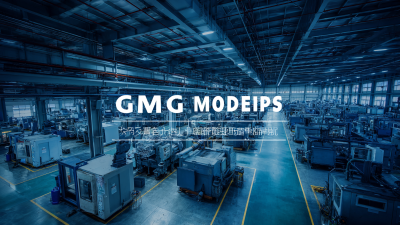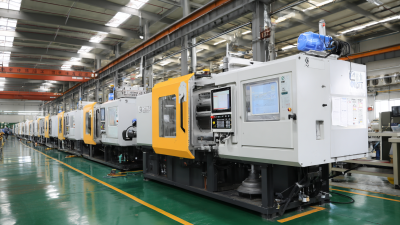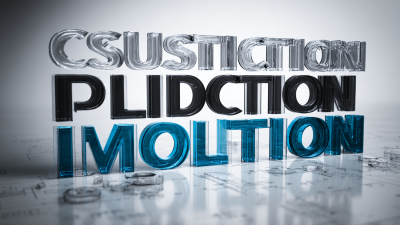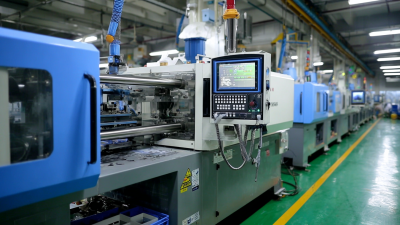In today’s increasingly competitive manufacturing landscape, sourcing Custom Plastic Injection Molding solutions has become a critical factor for success across various industries. According to a report by Allied Market Research, the global plastic injection molding market is expected to reach $408 billion by 2025, growing at a CAGR of 4.7% from 2018 to 2025. This growth highlights the escalating demand for customized plastic components that meet specific performance requirements and design specifications. As companies seek to optimize their production processes while reducing costs, understanding the top strategies for sourcing these solutions globally is more important than ever. This blog will delve into effective methods for identifying reliable suppliers, ensuring quality control, and leveraging technology in the procurement of custom plastic injection molding services.

The custom plastic injection molding industry is continuously expanding, presenting numerous opportunities for businesses across various sectors. Key industries that are increasingly seeking custom solutions include automotive, healthcare, consumer goods, and packaging. As environmental concerns rise, businesses are also turning their attention towards biodegradable plastics, which are projected to reach a market value of USD 33.52 billion by 2029. This shift is not just about meeting regulations; it reflects a growing consumer preference for sustainable products.
When sourcing custom plastic injection molding solutions, companies should keep a few tips in mind. First, prioritize partnerships with suppliers who specialize in innovative practices, particularly in biodegradable materials. This will not only align with market trends but also enhance your product offerings. Additionally, focus on industries that regularly seek packaging advancements, as injection molding is leading transformations in packaging efficiency. By aligning with these trends, businesses can position themselves strategically in the competitive landscape.
Moreover, embracing diversity in procurement can lead to better innovation and problem-solving. Actively seeking women-owned suppliers and fostering inclusivity within the manufacturing processes can unlock new perspectives and ideas in product development. Engaging with a diverse pool of manufacturers ensures a wider range of solutions and can lead to enhanced outcomes in custom plastic injection molding initiatives.
| Industry | Molding Techniques | Common Materials | Geographic Markets | Key Considerations |
|---|---|---|---|---|
| Automotive | Standard Injection Molding | ABS, Polypropylene | North America, Europe | Regulatory Compliance |
| Consumer Electronics | Gas-Assisted Injection Molding | Polycarbonate, Nylon | Asia, North America | Precision Tolerances |
| Medical Devices | Multi-Cavity Molding | Medical-Grade Polypropylene | North America, Europe | Sterility & Safety Standards |
| Packaging | Injection Blow Molding | PET, HDPE | Global | Sustainability Practices |
| Home Appliances | Compression Molding | HIPS, Polycarbonate | Asia, North America | Cost Efficiency |
When sourcing custom plastic injection molding solutions, evaluating global suppliers is a critical step in ensuring quality and efficiency. The first criterion to consider is the supplier's manufacturing capabilities. Look for companies equipped with state-of-the-art technology and a robust production process that can handle your specific requirements. Check if they have experience in your industry and can produce complex designs without compromising quality. Additionally, assess their ability to scale production as per your demand, which is crucial for meeting fluctuating market needs.

Another vital aspect is the supplier's quality control measures. Partnerships with suppliers that adhere to international quality standards, such as ISO certifications, can significantly reduce risks in production. Inquire about their testing processes and how they handle defects or deviations. Moreover, understanding their supply chain robustness, including sourcing of raw materials and their logistics capabilities, can provide insights into their reliability. By focusing on these criteria, businesses can make informed decisions in selecting the right partners for their custom plastic injection molding needs, ultimately leading to successful collaborations.
Navigating international trade regulations is crucial for companies involved in sourcing custom plastic injection molding solutions. Understanding these regulations helps mitigate risks associated with compliance and can significantly impact the efficiency of the supply chain. As global businesses expand, being knowledgeable about the specific trade policies in different countries becomes essential.
 Tip 1: Research the specific import and export regulations for plastic products in the target countries. This includes tariffs, restrictions, and labeling requirements that may impact your sourcing strategies. Staying informed can help you avoid costly delays and ensure a smooth process.
Tip 1: Research the specific import and export regulations for plastic products in the target countries. This includes tariffs, restrictions, and labeling requirements that may impact your sourcing strategies. Staying informed can help you avoid costly delays and ensure a smooth process.
Additionally, as businesses in various regions work to enhance their supply chains, it's important to keep an eye on government procurement guidelines and financial support programs. Such initiatives can provide valuable resources and frameworks for compliance in sourcing practices.
Tip 2: Develop partnerships with local experts or consultants who specialize in international trade regulations. They can provide insights and guidance tailored to your operational needs, ensuring that you remain compliant while optimizing your sourcing strategies. Embracing this proactive approach not only reduces risk but can also lead to improved negotiation positions and better supplier relationships.
In today's competitive landscape, leveraging technology and innovation is crucial for sourcing custom plastic injection molding solutions globally. The global plastic injection molding market was valued at approximately $265 billion in 2021 and is projected to reach $405 billion by 2028, growing at a CAGR of 6.4%. This upward trajectory underscores the importance of adopting advanced technologies such as automation, robotics, and AI-driven design processes that enhance production efficiency and accuracy.
Furthermore, the integration of Industry 4.0 principles, particularly in smart manufacturing, allows for real-time data analytics and IoT connectivity, leading to improved decision-making and resource management. A recent study indicated that companies implementing smart technologies in injection molding saw a 20% reduction in production costs and a 30% increase in productivity. Embracing innovations not only streamlines operations but also provides businesses with the agility to adapt to changing market demands while maintaining high standards of quality and customization in their products.
This chart illustrates the percentage of companies implementing various strategies for sourcing custom plastic injection molding solutions globally. The data is based on recent industry research focusing on technology and innovation in production.
In today's rapidly evolving manufacturing landscape, building sustainable practices in custom plastic injection molding sourcing has become a vital priority for companies seeking to enhance their environmental responsibility. By prioritizing eco-friendly materials and processes, businesses can mitigate their impact on the planet while still achieving high-quality production outcomes. Utilizing biodegradable plastics and incorporating recycled materials into the sourcing strategy not only reduces waste but also appeals to increasingly eco-conscious consumers.
Moreover, fostering long-term relationships with suppliers who prioritize sustainability is essential in this journey. Collaborating with suppliers that implement energy-efficient practices and sustainable production methods helps create a more resilient supply chain. Regular assessments and audits of sourcing partners enable companies to ensure they meet environmental standards, thus promoting a culture of sustainability within the industry. By embedding these practices in their sourcing strategies, businesses can lead the way in promoting responsible manufacturing and contribute to a circular economy.






